MY WORLD OF TRUTH
Friday, 14 April 2017
THE JOY OF A CHRISTIAN AND MUSLIM WEDDING
The attacks this week on Coptic churches in northern Egypt underline the dangers faced by the country's Christian minority. But among the Nubians - an ancient nation that lives along the upper reaches of the Nile - Muslims and Christians mostly live in harmony. Nicola Kelly attended a Muslim-Christian wedding, celebrated discreetly after nightfall, in the southern city of Aswan.
"Everyone kept telling me I should marry a girl from my community - but it was impossible," Akram says, his eyes crinkling. "I couldn't stay away from her."
It's the morning of Akram's wedding, in a village on the western bank of the Nile, and he's busily preparing to go to the mosque to say his vows.
This won't be a traditional ceremony. Akram will be taking his vows alone while his bride-to-be Sally recites her prayers quietly at home.
Sally wouldn't openly identify as a Christian - she wouldn't feel safe. But she has a pastor, practices Christian traditions and says she would baptise any children she had.
"We're the first people to marry outside of our religion here. That's very difficult, especially for my parents," Akram explains.
For seven years, the couple were banned from seeing each other by both sets of parents.
Members of the community, religious leaders and friends tried to prevent them from meeting, but they still managed to arrange some brief encounters.
"We agreed to get married at night, so as not to bring shame on either of the families," Akram says.
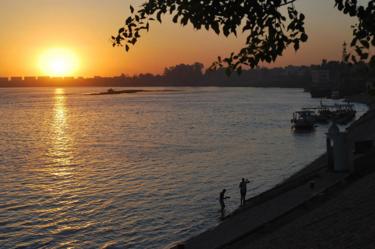 GETTY IMAGES
GETTY IMAGES
For Nubian couples like Sally and Akram, marrying across the religious divide is not forbidden - haram - but it remains a social taboo. So they celebrate the day individually until, at night, they meet under cover of darkness and mark their first moments of married life with a dance.
Akram and Sally met seven years ago in Aswan, on the eastern bank of the Nile, where young people hang around, eat ice cream and flirt. It's just a short boat ride from their village, Shadeed.
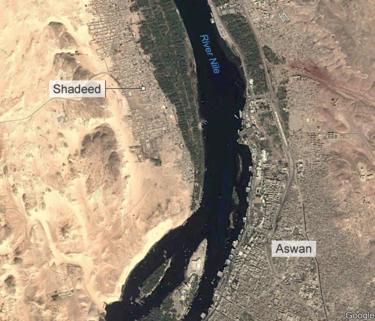
"She liked my jokes," Akram says, with a cheeky glint in his eye. "And I always looked forward to seeing her. It hasn't been easy, but we're here now."
Elsewhere in Egypt, Akram and Sally's marriage would be a risky undertaking.
Since the revolution in 2011, attacks on Christians in Egypt have soared. There were 54 recorded incidents of violence against religious minorities last year, in addition to a deadly suicide attack on the Coptic Cathedral in Cairo shortly before Christmas.
Earlier this week, 45 people were killed and scores injured in two further bombings at Coptic churches in Alexandria and the nearby Nile delta city of Tanta.
But Akram doesn't seem worried. He's slumped in the shade under a date palm, shovelling falafel into his mouth.
In the last week, he has had the same conversation more than a thousand times, going door-to-door to invite people to the wedding. This is the Nubian tradition. If someone received a written invitation they would be insulted, and would not attend.
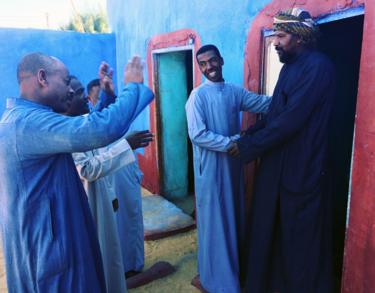
"Speaking to our neighbours, singing songs, eating and dancing. That's more important to us grooms than the religious part of the day, anyway!" he exclaims, offering me some jabana - coffee infused with cardamom and cinnamon.
Several cups later, his friends drag him up and nudge him across the sandy courtyard towards the mosque. As we pass through a mango plantation, Akram points to a ruined church.
"Some of the Christian buildings here have been attacked by outsiders, but we all got together and we drove them away."
Round the corner at the mosque, imam Mohamed Sobhy is dusting off a step. He's a scholarly, humble man, who proudly shows off his bookshelves stuffed with theological works on Islam, Christianity and a host of other religious texts.
"We had Christianity here for more than 800 years," he says, referring to the period before Islamisation, almost a millennium ago. "For me, inter-marrying is not a big deal. I want people to accept each other. Muslims and Christians, we can live in peace."
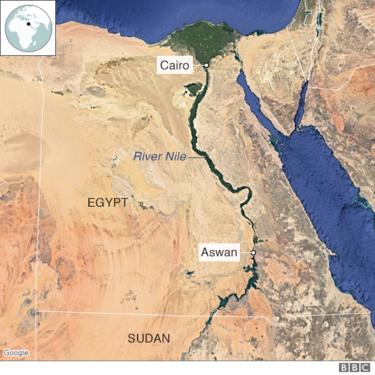
He pats Akram's shoulder.
"In our community, divorce is not common. And marrying more than one woman is not allowed. For our young men, Christianity has had a very positive influence!"
On the other side of Shadeed, Sally is battling wedding jitters at her childhood home. Her friends are all high-pitched screeches, mirror checks and selfies, but she's trying to remain composed.
Rosary beads are strung around her neck and a sign of the cross takes pride of place above the doorway of each room in the house.
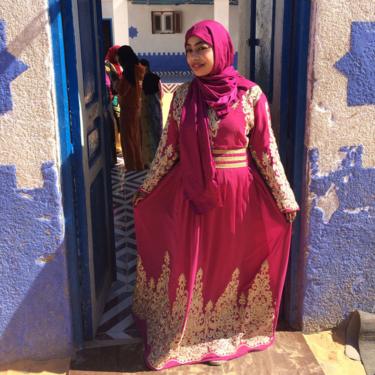
"All I have to do is come along, dance, people congratulate me and then we leave," she says, giggling nervously.
"I don't care about the vows. That's all for other people, not for us, the couple. It's not my priority."
For the bride, getting to this point has taken many years of quiet conversations with her husband-to-be and slightly louder discussions with her family.
"I have always loved him, but I didn't think we would be allowed to marry. My father said no for a long time, but now the imam and the pastor have agreed, it's not so bad for him."
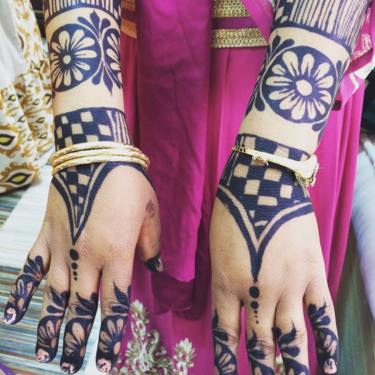
As night falls, the women take a boat over the Nile to the hairdresser's. Sally disappears into the salon as her friends fluff out the layers of the bridal gown and take several hundred more selfies.
Sally emerges a few hours later, much changed from the nervy 18-year-old I met before nightfall.
"I feel very confident. I am very beautiful now," she says, assuredly. She looks regal, her headscarf and wide hoop dress covered in white lace and her eyes lined with heavy kohl.
Shortly before midnight - and long overdue - Akram's car pulls up outside the salon.
"He's three hours late!" Sally shouts to her friends, attempting to regain her composure and shushing the rabble.
Outside, Akram is straightening his tie and nudging his hair into place.
"It's the first time I've ever worn a suit. It's not very comfortable! I'm looking forward to getting back into my jellabia after the dance," he says.
Goatskin drums are distributed among his friends and they gather around in an orderly circle.
A hush descends as Akram makes his way into the salon - then ululation and applause erupts as they emerge, arms linked.
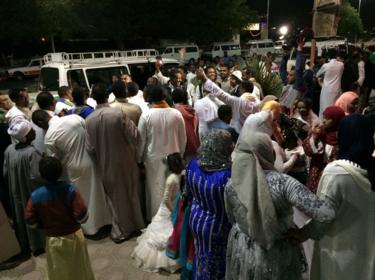
At first the dance is segregated.
The bride's guests circle her, careful not to bump against the hoop or stand on a layer of lace.
Next to them, relatives and friends raise Akram on to their shoulders, then throw him in the air in time to the drumbeat, limbs flailing.
"This is the best part!" Akram shouts, delighted.
The crowd then divides to allow the bride and groom to dance face-to-face. Their arms are held aloft and they circle around each other, courting, glancing but never touching.
Five minutes later, the drums reach their conclusion and man and wife stand still, beaming at each other.
"Now we can go back to Shadeed, eat food and begin our lives together," Akram exclaims enthusiastically.
Sally smiles shyly next to him. I ask if she's looking forward to the next phase.
"Yes, I'm ready to begin having a family. I want lots of children," she says, eyes flicking up briefly to her husband, face flushed and eyes bright. "I hope now everyone will accept our marriage and it will become easier for us."
posted by Davidblogger50 at 01:07

0 Comments:
Post a Comment
<< Home